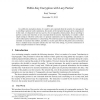Free Online Productivity Tools
i2Speak
i2Symbol
i2OCR
iTex2Img
iWeb2Print
iWeb2Shot
i2Type
iPdf2Split
iPdf2Merge
i2Bopomofo
i2Arabic
i2Style
i2Image
i2PDF
iLatex2Rtf
Sci2ools
IEICET
2016
2016
Public-Key Encryption with Lazy Parties
In a public-key encryption scheme, if a sender is not concerned about the security of a message and is unwilling to generate costly randomness, the security of the encrypted message can be compromised. In this work, we characterize such lazy parties, who are regraded as honest parties, but are unwilling to perform a costly task when they are not concerned about the security. Specifically, we consider a rather simple setting in which the costly task is to generate randomness used in algorithms, and parties can choose either perfect randomness or a fixed string. We model lazy parties as rational players who behave rationally to maximize their utilities, and define a security game between the parties and an adversary. Since a standard secure encryption scheme does not work in the setting, we provide constructions of secure encryption schemes in various settings.
Related Content
| Added | 04 Apr 2016 |
| Updated | 04 Apr 2016 |
| Type | Journal |
| Year | 2016 |
| Where | IEICET |
| Authors | Kenji Yasunaga |
Comments (0)

